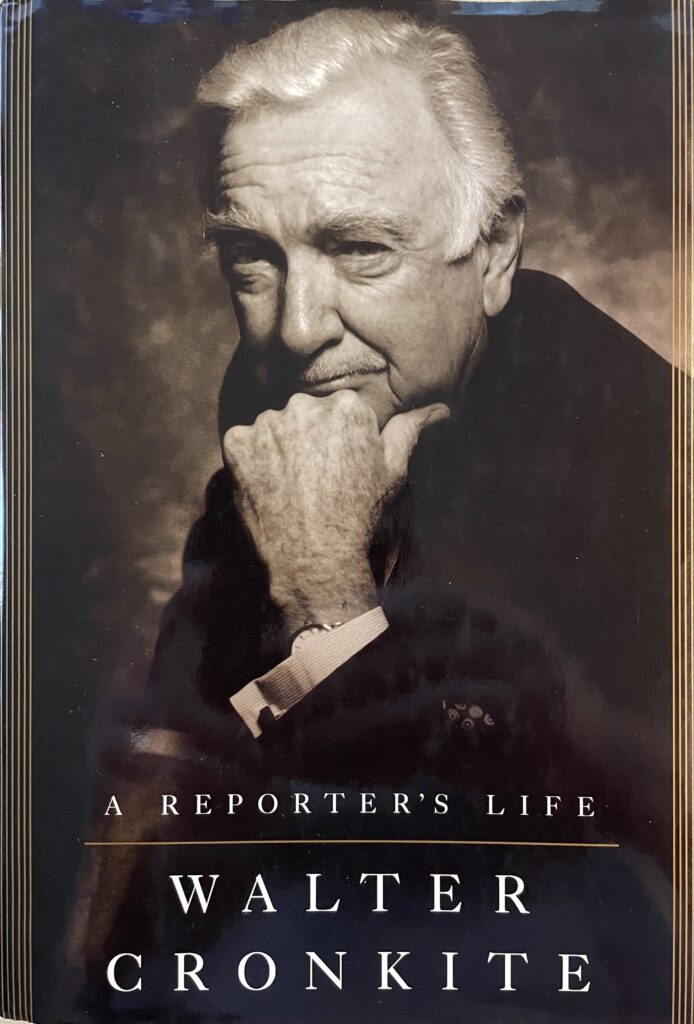For our news sources, we once trusted people with names like Huntley, Brinkley and Reasoner. But the king was Walter Cronkite.
High Point: Cronkite describes his first-hand perspective of many famous events and people of the 20th century.
Low Point: A few passages have little relevance to today’s reader, and as a result, are a bit dry.
Author: Walter Cronkite
Publication Date: 1996
Genre: Biography
Project Gutenberg: Not available
LibriVox: Not available
Movie/TV Adaptation: None
Before the internet and streaming services—when people’s television news sources originated from the three broadcast networks—we trusted people with names such as Huntley, Brinkley, Chancellor, Severeid and Reasoner. But the king was Walter Cronkite.
Cronkite’s A Reporter’s Life provides the background that helped shape his long news career. He grew up in Texas at a time when racial segregation was as strong as ever. He covered Texas politics in Austin, and as his career progressed, served as a war correspondent in Europe during the Second World War. He covered the Nuremberg trials, and then moved to Moscow as the Cold War developed. After returning to the US, he soon became the anchorman for the CBS Evening News—a post he held for almost 20 years.
During that time, Cronkite covered the key events and grew to know the individuals who shaped the world. His book provides fascinating insights to many of the stories he reported and the high-profile people with whom he was acquainted.
Reading his autobiography almost 30 years after its publication provides the advantage of having internet sources of videos of the events he describes. When John Kennedy was killed in 1963, for example, Cronkite indicates he almost lost his composure while announcing the President’s death: “The words stuck in my throat. A sob wanted to replace them. A gulp or two quashed the sob, which metamorphosed into tears forming in the corners of my eyes.”
If you were lucky enough to experience those old trusted news sources, Cronkite’s A Reporter’s Life—with its emphasis on fairness, objectivity and integrity—may make you more than a bit wistful. If you didn’t have a chance to see them on your nightly news, I’m sorry. You really don’t know what you missed.
Quotes
| “History must share with reading, writing and arithmetic first rank as the most important subjects in the curriculum. Understanding the issues on which citizens of a republic are expected to vote is impossible without an understanding of the past. Those who have the opportunity but fail to impart that lesson can be accused of sabotaging the democratic process.” |
| “Of course, total objectivity doesn’t please fringe fanatics. Their concept of objectivity boils down to their own prejudices. I could tell that we were neutral on controversial issues when complaints from the left and the right roughly balanced out. I felt if we were being shot at from both sides, we must be in the middle of the road.” |
| “It is always easier for an affluent society such as ours, and particularly one linked by heritage and relationship to the cultivated societies of Europe, to side with a regime that seeks to duplicate and preserve the looks and demeanor of our lifestyle, to which we are accustomed, rather than to embrace those whose native culture and appearance are different from our own.” |
| “…a free, unintimidated and unregulated press is democracy’s early warning system against both the dangers of democracy’s own excesses and the approach of tyranny. And inevitably, one of the first signs of tyranny’s approach is its heavy footstep on the threshold of press freedom.” |



